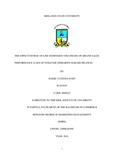Please use this identifier to cite or link to this item:
https://cris.library.msu.ac.zw//handle/11408/2772| Title: | The effectiveness of line extension strategies on brand sales performance: case of Unilever Zimbabwe Harare branch | Authors: | Faifi, Hazel Tatenda | Keywords: | Brand sales performance | Issue Date: | 2016 | Publisher: | Midlands State University | Abstract: | The study was to determine the effectiveness of line extension strategies on brand sales performance with reference to Unilever Zimbabwe Harare branch. The research was centered on Unilever’s most recent line extensions for its Lifebuoy and Vaseline brands. The objective of the study was to establish the impact of introducing a new flavor or variant on brand sales, to determine the effectiveness of new formulation on repeat purchases and to measure the effect of new packaging on brand sales. The main sources of data used in the research are primary and secondary data. Two research designs were used which are explorative and descriptive research designs. A sample size of 100 respondents was used. The sample frame consisted of management, employees, and customers. Probability sampling was used to select the targeted respondents, there after stratified sampling and simple random sampling were used respectively. Questionnaires were administered to customers and employees, for management interviews were conducted. The results of the research tools indicated that line extensions in the form of new flavor and formulation were most successful in increasing sales and customers. The study also showed that line extensions in the form of new packaging did not positively impact brand sales. The study concluded that line extension strategies in the form of a new flavor or formulation had resulted in an increase in sales and customer base for Unilever Zimbabwe. This further lead to an increase in profitability, market share and brand awareness. Findings from data collection showed that customers liked the new flavor Lifebuoy lemon fresh and the improved formulation for the brand. However some customers indicated that they still viewed Vaseline as a less premium brand as compared to Nivea one of its major competitors. The researcher recommended that Unilever need to fully understand its target market and conduct competitor analysis to fully understand why its target market for Vaseline still prefer purchasing other brand and are not loyal to the company’s brand. Unilever also needs to introduce more flavors for its Lifebuoy brand as competitor brands a still offering a wider portfolio as compared to their own product portfolio. Celebrity endorsements and competitor analysis are further areas of study and are very vital in today’s hyper competitive environment and helps establish a competitive edge for an organization. | URI: | http://hdl.handle.net/11408/2772 |
| Appears in Collections: | Bachelor Of Commerce Marketing Management Honours Degree |
Files in This Item:
| File | Description | Size | Format | |
|---|---|---|---|---|
| Hazel Tatenda Final Dissertation.pdf | Full Text | 1.45 MB | Adobe PDF |  View/Open |
Page view(s)
182
checked on Apr 4, 2025
Download(s)
128
checked on Apr 4, 2025
Google ScholarTM
Check
Items in MSUIR are protected by copyright, with all rights reserved, unless otherwise indicated.



